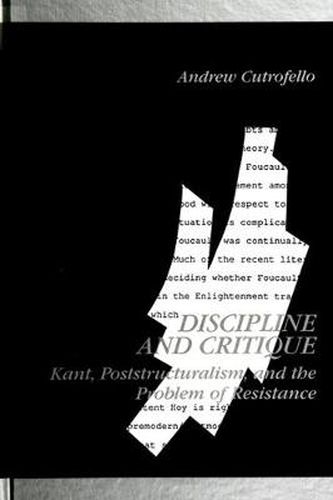Readings Newsletter
Become a Readings Member to make your shopping experience even easier.
Sign in or sign up for free!
You’re not far away from qualifying for FREE standard shipping within Australia
You’ve qualified for FREE standard shipping within Australia
The cart is loading…






Andrew Cutrofello demonstrates that in light of Michel Foucault’s genealogical criticisms of the juridical model of power, it is possible to develop a postjuridical model of Kantian critique. Recasting game theory’s celebrated prisoner’s dilemma in Foucauldian terms, Cutrofello illuminates the techniques of mutual betrayal that train bodies to reason themselves into complicity with forces of subjugation. He shows how a genealogically reformulated version of Kantian ethics can provide the basic parameters of a discipline of resistance to such forces, and he argues for a more nuanced assessment of the stakes involved in the demise of philosophy as a disciplinary formation. Along the way, Cutrofello presents fascinating readings of Kant’s own care of the self ethic, drawing on the conceptual resources of Gilles Deleuze, Jacques Lacan, and Luce Irigaray. This tour-de-force will prompt social theorists to reconsider the way power functions in our modern/postmodern world.
$9.00 standard shipping within Australia
FREE standard shipping within Australia for orders over $100.00
Express & International shipping calculated at checkout
Andrew Cutrofello demonstrates that in light of Michel Foucault’s genealogical criticisms of the juridical model of power, it is possible to develop a postjuridical model of Kantian critique. Recasting game theory’s celebrated prisoner’s dilemma in Foucauldian terms, Cutrofello illuminates the techniques of mutual betrayal that train bodies to reason themselves into complicity with forces of subjugation. He shows how a genealogically reformulated version of Kantian ethics can provide the basic parameters of a discipline of resistance to such forces, and he argues for a more nuanced assessment of the stakes involved in the demise of philosophy as a disciplinary formation. Along the way, Cutrofello presents fascinating readings of Kant’s own care of the self ethic, drawing on the conceptual resources of Gilles Deleuze, Jacques Lacan, and Luce Irigaray. This tour-de-force will prompt social theorists to reconsider the way power functions in our modern/postmodern world.